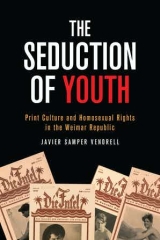
Assistant Professor of German
Core Faculty in Gender, Sexuality & Women's Studies
Education
Ph.D., M.A. University of Wisconsin-Madison
B.A. University of Iowa
Javier Samper Vendrell (he/him) is Assistant Professor of German and core faculty in the Program in Gender, Sexuality, and Women’s Studies. His research focuses on LGBTQ+ history, literature, film, television, photography, and print culture in Germany since 1890. His research and teaching interests encompass nineteenth- and twentieth-century German and European cultural history; race, gender and sexuality; and youth and popular cultures. His current research focuses on two main areas: homoerotic photography and the cultural history of queer childhood.
Samper Vendrell’s first book, The Seduction of Youth: Print Culture and Homosexual Rights in the Weimar Republic, was published in 2020 by the University of Toronto Press. The book is part of a body of growing interdisciplinary cultural studies that address the production of non-normative sexual identities, the history of homophobia, and the relationship between mass culture and politics. In particular, it investigates the wide-spread belief at the time that homosexuals were cunning seducers of youth and how those within the homosexual emancipation movement reacted against this pervasive homophobic trope. The book has been reviewed in The Point, H-German, H-Soz-Kult, Central European History, German History,Art History,Monatshefte, Norma: International Journal of Masculinity Studies, Mosse Program, and the Journal of the History of Sexuality. You can also listen to Samper Vendrell talk about the book in New Books Network.
He has recently co-edited with Vance Byrd the volume Queer Print Cultures: Resistance, Subversion, and Community, which will appear in fall 2025 in the Studies in Book and Print Culture Series of the University of Toronto Press. The book brings together interdisciplinary scholarship on the history of the book, visual culture, popular culture, pedagogy, digital humanities, and queer studies to challenge traditional histories and theories of printed objects, material and visual culture, publishing, and readers. The essays consider what printed materials and the traces of queer print use can tell us about the history of gendered and sexual embodiment, as well as how books interact with us, with each other, and with other objects.
Samper Vendrell is currently working on a second book, Fear of the Bogeyman: Children, Queerness, and Monsters in German Culture. The book argues that the bogeyman has long served as an effective tool to compel children to be obedient. Drawing upon LGBTQ+ studies, childhood and youth studies, as well as film and literary studies, he contends that adults also rely on this figure to quell children’s curiosity about gender and sexuality. Samper Vendrell examines the trope of the bogeyman in German literature, film, and television from the 1820s to today to show how children are punished for straying from the “straight” path. Despite this normative aim, the bogeyman is a powerfully ambiguous homophobic trope. He is often represented as a despicable queer figure, not necessarily because he is a homosexual, but rather because he disrupts heterosexual reproductive logics with his heinous acts. By pointing out the unstated queerness of bogeymen, Samper Vendrell critiques the underlying homophobia in gothic fiction, film noir, police shows, and in moral panics about children and sexuality. Although queer people today are represented in media more authentically and sympathetically than ever, Samper Vendrell contends that understanding the cultural phenomenon of the bogeyman remains urgent. Manifestations of this figure reappear in contemporary debates about childhood education and “gender ideology.
Samper Vendrell is also working on a series of articles on homoerotic photography in the early twentieth century. Be examining photographs by Wilhelm von Gloeden, Adolf Brand, and Herbert List, he argues that male nude photography has played a role in shaping homoerotic desire and shows how these images are entangled in other discourses, such as pederasty, colonialism, and racism.
Research Interests
LGBTQ+ history, literature, film, television, and visual and print culture in Germany since 1890; queer childhood and youth.
Selected Publications
- "'I am rooted, but I flow': Écriture Fluide, Becoming, and Healing in Kim de l'Horizon's Blutbuch," Monatshefte 116, no. 4 (2024): 596–616.
- “Von Gloeden's Dog: Methodological Notes of Photography and the History of Intergenerational Intimacy,” Journal of the History of Sexuality 33, no. 3 (2024): 418–37.
- (with Vance Byrd) "Queer Print Culture and German Studies," The German Quarterly 97, no. 2 (2024): 282–84.
- "Reading Queerness in Babylon Berlin." In Babylon Berlin, German Visual Spectacle, and Global Media Culture. Edited by Hester Baer and Jill S. Smith, 141–56. London: Bloomsbury, 2024.
- "Jojo Rabbit, or on Education: Taika Waititi’s Take on Childhood, Democracy, and Hope." Jeunesse: Young People, Texts, Culture 15, no. 2 (2023): 59–73.
- "Queer Adolescence in Mädchen in Uniform." German Life and Letters 75, no. 1 (2022): 22–39.
- "Queer Utopia in Klaus Mann’s Der fromme Tanz." The German Quarterly 94, no. 1 (2021): 83–98.
- "Adolescence, Psychology, and Homosexuality in the Weimar Republic." Journal of the History of Sexuality 27, no. 3 (2018): 395–419.
- "The Case of a German-Jewish Lesbian Woman: Martha Mosse and the Danger of Standing Out." German Studies Review 41, no. 2 (2018): 335–53.
- "The Queer Threat to Civilization in Fritz Lang’s M." The Germanic Review: Literature, Culture, Theory 92, no. 3 (2017): 264–79.
Courses Taught
GRMN/URBS 1050: Metropolis: Culture of the City; GRMN 3215: German Youth Cultures; GRMN 5690: New German Fiction; GSWS 0002: Gender & Society; GSWS/HIST 2879: Global Queer History.
Affiliations
Graduate Group, Program in Comparative Literature & Literary Theory

 Germanic Languages and Literatures
Germanic Languages and Literatures
